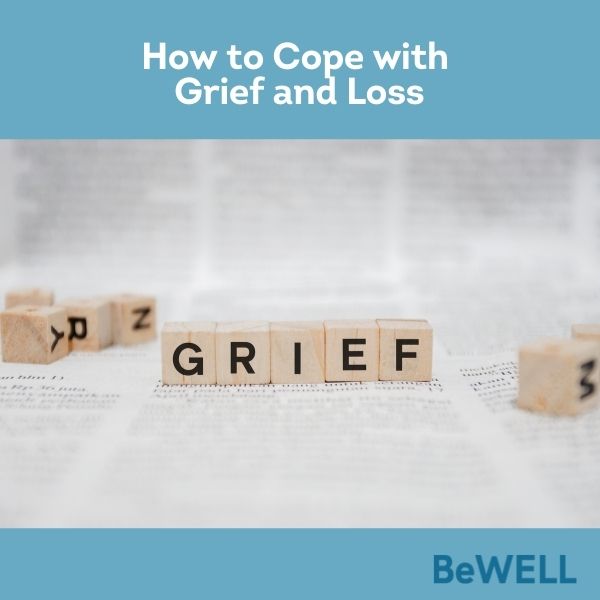Losing someone or something you love can be one of the most painful challenges that we all must face at some point in our lives. Coping with the death of a loved one may seem like the most devastating form of loss, but there are many other ways in which we experience loss, which can be just as overwhelming to deal with as a physical death. Coping with grief and loss can be a long and painful process, but it is important to remember that there are no wrong ways to grieve. You may experience intense emotions like shock, anger, frustration, intense sadness, and feelings of hopelessness.You may also have feelings of numbness, apathy, and feeling disconnected from the situation. No matter what the loss, or what the process in which you grieve and experience the loss, there are ways to deal with loss in a healthy and healing way.
Coping with Cancer
October was Breast Cancer Awareness month. Breast cancer affects 1 in 8 women, and according to The National Cancer Institute, cancer as a whole will affect roughly 2 million people in the United States this year. While not all cancer is deadly, and science is progressing rapidly to treat cancer, it can be a devastating diagnosis physically, emotionally, and mentally for those affected by it. Being diagnosed with cancer can feel like a death sentence. Coping with your own mortality, losing one’s health, surgeries, and coping with the physical changes your body undergoes during treatment, such as losing your hair or mastectomy, takes a toll on your mental well being. Even if you, or the loved one diagnosed with cancer survives, there is still a very real sense of loss and a grieving process. It is normal to have feelings of loss and it is important to remember that you are not alone. If you or someone you love has been diagnosed with Breast Cancer, or any type of cancer and is struggling, a Be.Well therapist can help you cope with the changes and help you deal with your grief.
5 Stages of Grief
Dealing with grief and loss is not a universal or linear process, however it is commonly observed in those who are grieving or experiencing loss, that there are 5 stages. According to Kübler-Ross, a Swiss Psychologist who observed grief and loss in terminally ill patients, people experience grief in 5 distinct stages: Denial, Anger, Bargaining, Depression, and Acceptance. Not everyone experiences all 5 stages, and people do not experience them in the same order, however it is the most widely accepted way to understand grief and loss. If you do not experience one or any of these stages, it is ok, as grief is a uniquely personal process. You may also find that your stages of grief vary between losses. You may have more intense feelings of denial and bargaining when you are dealing with the loss of a marriage, for example, and may have more intense feelings of depression while dealing with the death of your mother. Each type of loss varies, and where we are in the stage of our lives plays a large role in how we process grief. People who are affected by a cancer diagnosis, either personally or by proximity, will most likely experience some or all of these stages of grief while making sense of the diagnosis.
Denial
Denial is the first stage of grief and it helps us survive the loss. This stage can feel like shock or numbness. If you are diagnosed with a disease, you may think that the doctors are wrong or you don’t understand how this could happen to you. You may deny that it is true because you can’t imagine your life being different. It is a useful stage because denial allows us to pace out the grief. We protect ourselves from feeling all the loss at once and are able to go on day by day. In this stage we push away uncomfortable feelings, but as we move through the grieving process, feelings begin to surface.
Anger
The next stage is anger. When we experience a loss we may feel tremendous anger. Anger at the world. Anger at the doctors. Anger at God. Anger is a useful stage of grief because after a grief event you may feel disconnected from the world around you. You may feel totally alone and abandoned. Anger can be the thing that binds you back to reality and people. Anger is also a more familiar and accessible emotion for many people to feel, so it is something to hold onto when a grief event makes you feel out of control.
Bargaining
Bargaining is the next stage of grief. This stage gives us false hope. Sometimes we bargain with God, making promises that we will never do a bad thing again if only our suffering will go away, or bargain with ourselves about things we will never do or say again. This stage also can also be filled with a lot of “what if’s” and “if only”, we tend to fixate on things that may have changed the outcome because we still hope it can be fixed.
Depression
The next stage of grief is depression and the most widely accepted stage. A lot of people associate depression directly with grief. Depression can feel like sadness, numbness, fatigue, or hopelessness. You may feel withdrawn from the world around you or like you can’t get out of bed. Depression may be one of the longest stages. During this stage you may have negative or self harming thoughts and may even have suicidal thoughts. If you or someone you love is coping with loss or grieving and having self harming thoughts, a be.Well therapist can help.
Acceptance
The final stage of grief is acceptance. Acceptance does not mean that you are happy with the loss you have experienced, but rather you have begun to accept that the grief event took place and know that you will be ok. You are no longer avoiding the event or feeling like you cannot live in your new reality. You begin to feel like yourself again and engage in activities that you used to find pleasure in. If you are coping with the loss of a loved one, you start to accept that your new life, while you miss them, is still going to have happiness and joy in it. If you are coping with the loss of a marriage or a disease diagnosis, like cancer, you begin to understand your new reality and make peace with your new life.
While the death of a loved one may be one of the largest types of loss we can experience, we can experience feelings of loss for a wide variety of reasons. A Be.Well Therapist can help you cope with a wide variety of grief events and losses.
Other types of losses can include:
- Loss of a relationship or friendship
- Divorce
- Breakup
- Death of a pet
- Loss of a job
- Retirement
- Giving up a dream or passion
- Changing careers
- Loss of financial stability
- Loss of one’s health
- Miscarriage or infertility
- Moving or selling one’s home
If you, or someone you love is struggling to overcome grief, such as a breast cancer diagnosis, the death of a loved one, or the loss of your marriage, you are not alone. A Be.Well Therapist is here to help you find peace with your event and make peace with your new reality. You do not need to suffer. Therapists can help you cope with loss and take control of your mental well being. A Be.WELL. Therapist is available in both Midtown, NYC and Hoboken NJ.



